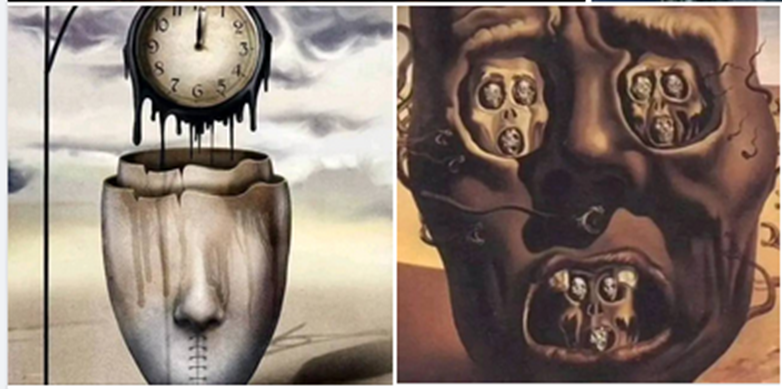Many wonder what "surrealism" means.

Surrealism, meaning supra-realism or post-reality, is a literary, artistic, and intellectual doctrine that wanted to deconstruct the reality of conscious life, and claimed that above or beyond this reality there is another reality that is stronger in effectiveness and greater in scope, which is the reality of the subconscious or subconscious, and it is a reality repressed within. The human soul, and this reality must be liberated, released from repression, and recorded in literature and art. It seeks to introduce new relationships and contents not drawn from traditional reality into literary works. These contents are derived from dreams
Founding and most prominent figures:
= In the aftermath of World War I, a shock struck European humanity that shook the souls and confused the minds, as a result of the complete destruction and wanton loss of lives. A sweeping tendency arose to degrade moral values and liberate pent-up instincts and desires in the human soul. This tendency extended to art and literature, which led to the emergence of The doctrine known as Surrealism appeared in France in 1924 AD, which began with psychological surrealism. Then surrealism entered the fields of literature, sociology, economics, and art. Among the most prominent surrealist figures are:
André Breton (1896 - 1966 AD), a French psychologist and poet, is considered by critics to be the founder of surrealism.
Thornton and Aylor, a playwright, wrote the play The Human Skin Between the Teeth in 1942 AD, which is a play that tends to fantasy and violence resulting from the unconsciousness of the play’s characters.
- Salvador Dali, born in 1904 AD, is a Spanish painter. He is considered one of the most prominent advocates of Surrealism. He added many additions to it, the most notable of which is his distinctive style, which he called “criticism based on hallucinations.” He always emphasized that he was closer to madness than to sleepwalking, and knowledge for him was based on Association and interpretation.
Intellectual and ideological roots:

= Surrealism was influenced by the views of Freud, the Jewish psychologist, in his analysis of the human psyche, especially those that talk about the subconscious and dreams. Surrealism was also influenced by Marxist communist thought and its call for revolution. Surrealism was also influenced by a movement that preceded it called Dadaism, which was born in Zurich, Switzerland, in 1916 AD. It is an anarchist movement that disbelieves in prevailing values, beliefs and social traditions and calls for a return to the beginning
Surrealism began in the field of the human psyche, then entered the fields of literature, thought, politics, society, and art, and then, with its revolutionary anomaly, stormed the field of religious belief and social traditions.
Source: websites

